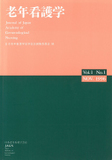Japanese
English
- 販売していません
- Abstract 文献概要
- 参考文献 Reference
老人看護学における臨地実習の学習過程で,高齢者に対する印象がどのように変化したかを,看護学生138人を対象に質問票を用いて調査した.高齢者に対する印象は16項目設定し,SD法を用いて測定した.その結果,調査時に高齢者と同居していると回答した者は27%であった.実習前後の高齢者に対する印象の変化で,統計学的に有意な差がみられたのは,16項目のうち5項目であった.また肯定的な印象に変化したのは7項目であった.生活体験による高齢者に対する印象への影響をみた結果,同居群と別居群の間に印象の得点が有意に異なっていたのは,実習前には4項目,実習後には5項目であった.また印象の得点を従属変数とした多次元配置分散・共分散分析結果を行った結果,実習前には「祖父母との会話の頻度」が重要な要因であることがわかった.実習後には明らかな要因はみられなかった.この研究を通して,看護学生が高齢者に抱く印象は,臨地実習の前後で変化していること,また生活体験による影響は実習後には減少することが明らかになり,臨地実習において多様な高齢者に接する機会を提供する必要性が示唆された.
A questionnaire survey was given to 138 nursing students to investigate changes in their impressions about elderly people during their clinical practices of geriatric nursing. The questionnaire included 16 questions using the semantic differential (SD) technique aimed at ascertaining students' impressions of elderly people. At the time of our investigation, 27% of the students were living in households containing elderly people. When the students' impressions before clinical practice about elderly people were compared with their impressions after clinical practice, significant differences were seen in their responses to 5 of the 16 questions. The responses to 7 questions suggested that students had more positive impressions about elderly people after clinical practice than before clinical practice. When impressions about elderly people were compared after clinical practice between the students living with elderly people and the students who did not live with elderly people, the differences in impressions between these two groups were significant in four items before clinical practice and in five items after clinical practice. Using the item scores of the impression as dependent variables, the results of an analysis of variance and covariance (ANCOVA) showed that the frequency of the communication with their grandparents was an important factor influencing the nursing students' impression about elderly people before clinical practice. However, the factors were not clear after clinical practice. These results suggest that nursing students' impressions about elderly people changed during their clinical practices of geriatric nursing, and the differences in impressions between these two groups had grown smaller. And these results suggest that making contact with a variety of elderly people will be especially effective for the nursing students in enhancing their understanding of the geriatric population.
Copyright © 1996, Japan Academy of Gerontological Nursing All rights reserved.


